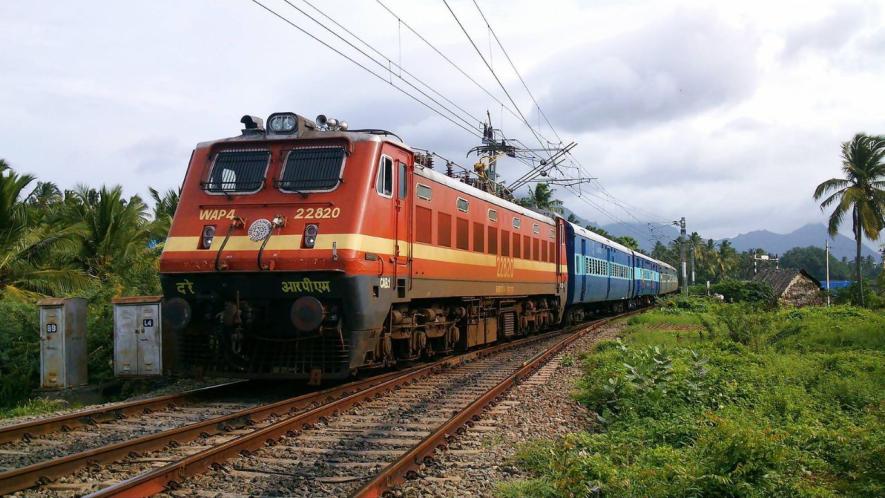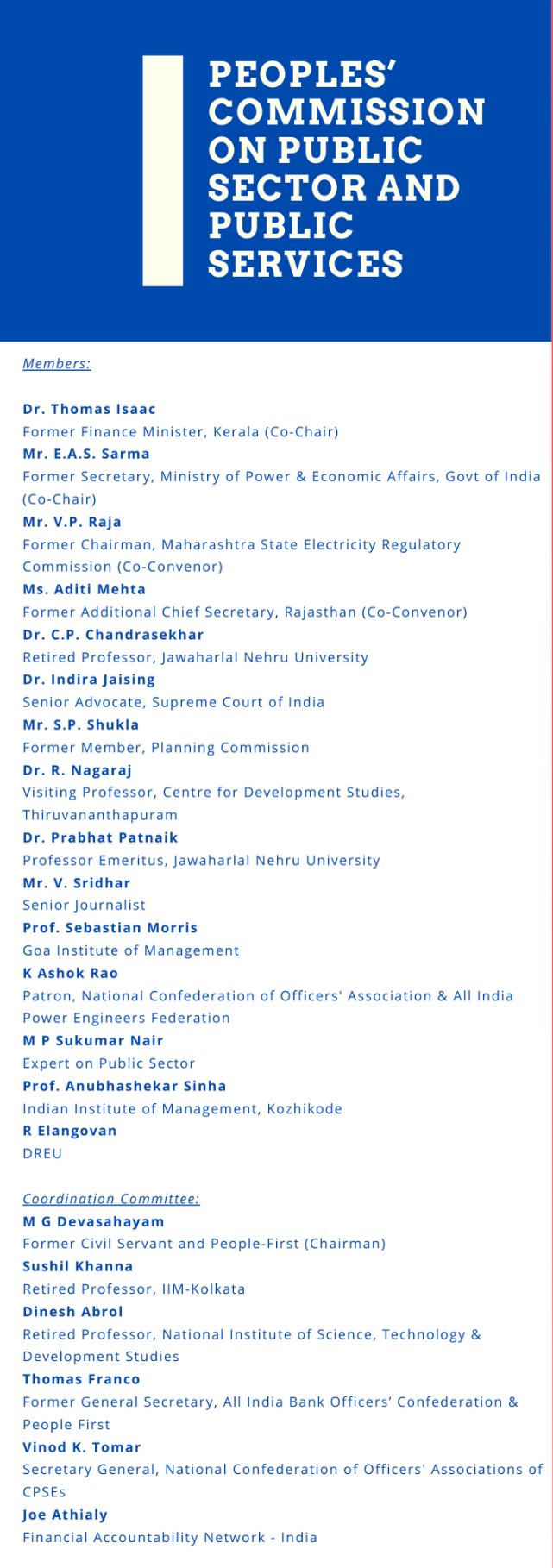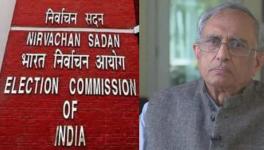People’s Commission Urges CAG to take Cognizance of Rail Board Bid to Privatise 4 Profit-Making Units

Representational Image. Image Courtesy: Wikimedia Commons
New Delhi: The People's Commission on Public Sector and Public Services (PCPSPS) has lashed out at the Railway Board’s proposed move to “open the backdoor” for private and foreign players by privatising four profit-making production units and urged CAG to take cognizance of the matter.
The four units targeted so far are: Integral Coach Factory (ICF), Chennai, Tamil Nadu, Marathwada Rail Coach Factory (MRCF), Latur, Maharashtra, Bananas Locomotive Works (BLW), Varanasi, Uttar Pradesh and Dahod Railway Workshop (DRW), Dahod, Gujarat.
In a letter to G C Murmu, the Comptroller and Auditor General, dated February 17, it said: “We feel that this is a fit case for CAG taking advance cognizance of and conducting a comprehensive performance audit lest the entry of private companies should become a fait accompli imposing a huge cost on the Railways and its long-term public interest implications,”
The People’s Commission, which consists of includes eminent academics, jurists, erstwhile administrators, trade unionists and social activists, such as EAS Sarma, Prabhat Patnaik, Aditi Mehta, Thomas Isaac among others, flayed the Railway Board for “rushing into inducting Indian and foreign MNCs for manufacturing coaches/ locos”, adding that it “seems to fit into the larger pattern of the present government indiscriminately outsourcing strategic works to private companies at the cost of national interest, by weakening the CPSEs deliberately by failing to fill vacancies at all levels, forcing them to allow private companies to exploit their infrastructure assets through “asset monetisation” and not allowing them to compete with private bidders lest they should outbid the latter.’
Digging holes into Prime Minister Narendra Modi’s hollow claims of ‘Atmanirbhar Bharat” while opening public sector units for private players, the letter said: “In the specific case of Railways' production units referred to above, they represent a rich legacy of self-reliance built assiduously over several decades of sweat and toil put in by the highly talented, committed employees of the Railways. Any responsible government interested in promoting self-reliance would do everything to strengthen the capacity and capability of each of those units to step up their manufacturing activity to match the rapidly increasing demand for railway infrastructure and rolling stock. We feel that it is highly imprudent on the part of the Railway Board to systematically dismantle that legacy to allow private companies, especially MNCs, to profiteer using the valuable railway assets through substantial hidden subsidies and earn huge profits by charging inordinately high prices. “

Read the full text of the letter below:
Date: 17.02.24
To
Shri G C Murmu
C&AG
Dear Shri Murmu,
The People's Commission has come to know that the Railway Board is opening a backdoor entry to private corporates, Indian and foreign, to privatise profit-earning Railway production units. The four units targeted so far are
1. Integral Coach Factory (ICF), Chennai, Tamil Nadu
2. Marathwada Rail Coach Factory (MRCF), Latur, Maharashtra
3. Bananas Locomotive Works (BLW), Varanasi, UP
4. Dahod Railway Workshop (DRW), Dahod, Gujarat
There could be more production units in the pipeline for such backdoor entry for private companies.
What distresses us most is that each one of these units is already manufacturing coaches/ locomotives at highly competitive costs, whereas the prices quoted by the private corporates are much higher. One of the agreements entered into by the Railway Board (Agreement for Manufacturing-cum-Maintenance of 6000 HP Freight and 9000 KW High Horse Power Passenger Electric Locomotives at Varanasi) with a private corporate is not only one-sided but it permits it to make use of the infrastructure facilities, the skilled manpower, and the resources belonging to the said Railway production unit for manufacturing coaches/ locomotives. The tender documents based on which private companies are chosen do not mandate their obligation to transfer technology nor do they limit the timeframe over which they carry out manufacturing activity using the Railway’s infrastructure and manpower. At the same time, the tender documents seem to permit the private companies to label the Vande Bharats with their brands, giving the impression that the Railways' own production units have no role. The private corporates thus using the resources of the production units are not required to compensate the latter. The one-sided agreements signed by the Railway Board effectively amount to private corporates brazenly allowed to profiteer at the cost of the Railways without the Railways deriving any net benefits. This calls for an independent investigation.
The agreements signed or to be signed with the private corporates, Indian and foreign, cover 200 Vande Bharat train sets to be supplied over the next 3-5 years. For this purpose, those private corporates will use the facilities, resources and skilled manpower of ICF and MRCF, as well as the designs and drawings provided by RDSO, for which the latter will not get compensated, suggesting huge hidden subsidies that allow these private corporates to earn undue profits at the cost of the Railways.
An equally disturbing fact is that the average cost of manufacture of a Vande Bharat by ICF is Rs 104 Crores, whereas the corresponding price payable to the concerned private corporates is Rs 139 Crores at the premises of ICF, and Rs 120 Crores for manufacturing Vande Bharats at MRCF. In other words, the excess price differential is around 15%-34%, not taking into account the huge hidden subsidies. We note that ICF has already manufactured and supplied 40 Vande Bharats successfully run by the Railways and another 35 are in the pipeline. Had the Railway Board not forced ICF to surrender 5000 posts and had it cared to fill the existing 2000 vacancies, ICF could have supplied many more Vande Bharats with utmost ease at far lower costs.
The most bizarre justification put forward by the Railway Board to allow entry of private corporates is that ICF is “unable” to rise to its expectations and supply a higher number of Vande Bharats. This in itself exposes the motives underlying the Railway Board's approach, as it is the Railway Board that has curtailed the capacity of ICF to supply more Vande Bharats by deliberately and mindlessly reducing its manpower.
Coming to BLW and DRW, since June 2022, the Railway Board has made attempts to call for bids from foreign MNCs to manufacture and supply 800 locomotives of 12,000 HP capacity at BLW and 1200 locomotives of 9,000 HP capacity at DRW over a timeframe of 10 years. The order for 1200 (9,000HP) locos went to an MNC for Rs 26,000 Crores, roughly twice the cost at which the same locos are manufactured by the Chittaranjan Loco Works (CLW) in W. Bengal. The MNC will manufacture only 120 locos per year, whereas CLW manufactures 400 locos per year. The Railway Board has already spent Rs 500 Crores on creating facilities at DRW to facilitate the MNC manufacturing the locos. The Railway Board spent this money to convert a railway workshop into a production unit. The MNC is likely to take advantage of that investment without having to compensate the Railways!
As far as BLW in Varanasi is concerned, after the original bid for 12,000 HP electric locomotives failed to evoke any response, the bid was revised three times to further make it attractive to foreign investors, but without response. As of now, the Railway Board has revised the bid further to restrict the loco capacity to 6,000 HP, offering BLW's infrastructure and resources. The Railway Board has already started building the additional infrastructure within BLW premises to attract and accommodate the foreign MNC.
BLW and CLW can manufacture and supply 6,000 HP and 9,000 HP capacity locos for the Railways. CLW had also successfully built and tested a 12,000 HP electric locomotive prototype. We understand that the Railway Board recently asked BLW, CLW and Patiala Loco Works (PLW) in Punjab to surrender 535, 3661 and 1007 vacant posts respectively, which in effect seems to be a ploy to reduce their ability to manufacture and supply a sufficient number of locos for the Railways, so that the Board may provide backdoor entry for MNCs.
How the Railway Board is rushing into inducting Indian and foreign MNCs for manufacturing coaches/ locos seems to fit into the larger pattern of the present government indiscriminately outsourcing strategic works to private companies at the cost of national interest, by weakening the CPSEs deliberately by failing to fill vacancies at all levels, forcing them to allow private companies to exploit their infrastructure assets through “asset monetisation” and not allowing them to compete with private bidders lest they should outbid the latter.
In the specific case of Railways' production units referred to above, they represent a rich legacy of self-reliance built assiduously over several decades of sweat and toil put in by the highly talented, committed employees of the Railways. Any responsible government interested in promoting self-reliance would do everything to strengthen the capacity and capability of each of those units to step up their manufacturing activity to match the rapidly increasing demand for railway infrastructure and rolling stock. We feel that it is highly imprudent on the part of the Railway Board to systematically dismantle that legacy to allow private companies, especially MNCs, to profiteer using the valuable railway assets through substantial hidden subsidies and earn huge profits by charging inordinately high prices.
Indian Railways, especially the production units mentioned above, have created a wide range of employment opportunities at ICF (Chennai), MRCF (Latur), BLW (Varanasi) and CLW (W. Bengal), developed highly skilled teams of committed employees and promoted self-reliance at each of those locations. Considering that the Railway Board has taken up back-door privatisation at each of those locations, we apprehend that the entry of private corporates, Indian and foreign, will progressively shrink employment opportunities for the local people. Indirectly, it will have a serious adverse impact on the recruitment of people belonging to the disadvantaged sections, which the private companies would put an end to. Clearly, the Railway Board has not applied its mind to such crucial socio-economically important concerns.
The railway employees’ associations have resisted the entry of private corporates in ICF and have been able to stop it for the time being, the agreement signed to date has not been revoked. While the Railway Board issued an order to ICF for supplying 50 rakes of 24 coaches each over a time frame extending up to 2026-27, we apprehend that the present government will renew efforts to induct Indian and foreign MNCs in all production units once elections are over.
The Railway Board has so far signed one agreement (Manufacturing-cum-Maintenance Agreement for Vande Bharat Trains) and the same continues to be valid on date. However, considering the tender conditions and the conditions stipulated in the agreement signed so far, we feel that the approach of the Railway Board to introduce private parties in the production units is quite clear and it is most certainly going to become a fait accompli soon, which will have serious adverse implications not only from the point of view of self-reliance but also from the point of view of the propriety of the Board. Allowing private companies to set up their shop within the premises of each of the above cited production units, using the units’ resources in an open-ended manner without compensating them and manufacturing and supplying locos and coaches at prices far higher than the costs at which those units are supplying is condemnable.
In conclusion, we feel that the Railway Board should review its approach to inducting private corporates and MNCs in its production units. It should fill the existing vacancies and give back the surrendered posts to enable those units to expand their capacity to be able to meet the rapidly increasing demand in the coming years. In our view, this is the only way for the Railway Board to strengthen its production infrastructure and promote self-reliance, not by permitting private corporates to take over the Railway infrastructure.
In particular, we feel deeply concerned that hidden subsidies should be passed on to the private corporates and MNCs by allowing them to use the infrastructure facilities, resources and skilled manpower of the units free of cost and, as if that is not enough, allowing them to manufacture and supply coaches/ locos at very high prices, much higher than the prices at which those production units are capable of supplying. This is nothing but allowing private corporates and MNCs to profiteer at the cost of the public exchequer, a matter that calls for an independent investigation.
We feel that this is a fit case for CAG taking advance cognisance of and conducting a comprehensive performance audit lest the entry of private companies should become a fait accompli imposing a huge cost on the Railways and its long-term public interest implications
People's Commission on Public Sector and Public Services
About Peoples’ Commission on Public Sector and Public Services (PCPSPS): Peoples’ Commission on Public Sector and Services includes eminent academics, jurists, erstwhile administrators, trade unionists and social activists. PCPSPS intends to have in-depth consultations with all stakeholders and people concerned with the process of policy making and those against the government’s decision to monetise, disinvest and privatise public assets/enterprises and produce several sectoral reports before coming out with a final report. Here is the first interim report of commission- Privatisation: An Affront to the Indian Constitution.
Get the latest reports & analysis with people's perspective on Protests, movements & deep analytical videos, discussions of the current affairs in your Telegram app. Subscribe to NewsClick's Telegram channel & get Real-Time updates on stories, as they get published on our website.






















